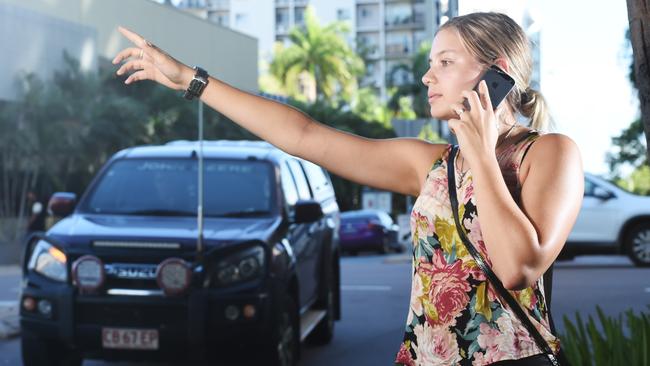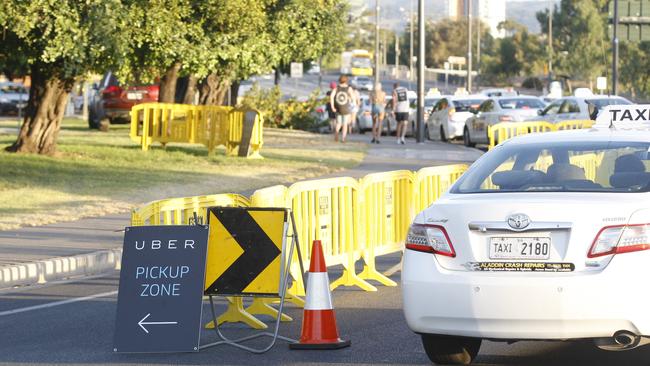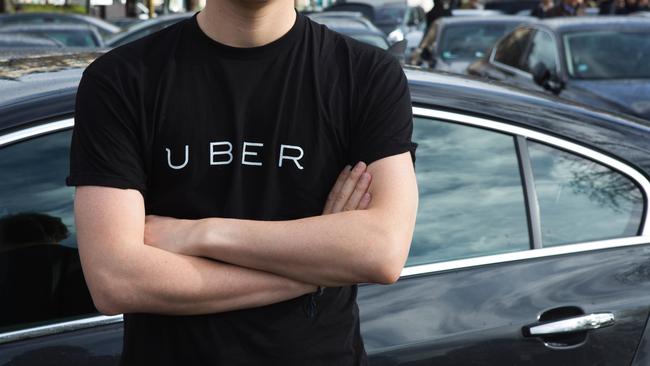Ride-sharing service Uber fights for its fair share in South Australia’s taxi and hire-car industry
SHOULD ride-sharing service UberX be allowed to operate in SA? A decision will be made soon, as we take a look at the ins and outs of the industry.

SA News
Don't miss out on the headlines from SA News. Followed categories will be added to My News.
- Cameron England: What’s the end game for Uber, and for Lyft
- Transport Minister warns that Uber rides could be illegal
- Latest blow to taxi industry as ACCC blocks Uber-style booking app
ANY day now, Transport Minister Stephen Mullighan is due to receive a report making recommendations to reform South Australia’s taxi and hire-car industry.
One of the most controversial issues the review committee has been considering, since the review was ordered last June, is whether to allow ride-sharing service UberX to operate in SA.
Uber operates in 379 cities around the world, offering carpooling, ride-sharing and premium services.
Its premium hire-care service, Uber Black, is allowed in SA but not the ride-sharing model UberX.
The company and the Opposition have called for a trial of the service here as governments in New South Wales and the ACT have moved in recent months to legalise the service there.
Mr Mullighan is remaining tight-lipped – saying only that he is “open” to more competition in the industry – but there is growing pressure on the SA Government to keep pace with progress interstate and open the SA market to the app-based operator.
The review committee has also considered how to improve service in the taxi and hire-car industries, including the standard of cars and the training of drivers, passenger fares and payments to drivers, car booking systems and the number of taxi plates allowed in SA.
Mr Mullighan has ruled out making any changes before he receives the review recommendations.
He expects to release a government response at the end of next month.
PAYMENT
It is understood the Government is likely to consider measures to slash the surcharge on taxi fares when paying by credit or debit card.
Mr Mullighan has sent strong signals about the cost of catching a cab, describing the 10 per cent surcharge on paying through a Cabcharge terminal – used in most taxis – as “outrageous”.
The NSW and West Australian governments have passed legislation to cap surcharges at 5 per cent, and it is expected SA could take a similar approach in a bid to lower costs for passengers.
It is also likely to make changes to encourage more companies that operate online payment platforms, but which do not impose a surcharge, to enter or expand in the SA market.
EMPLOYMENT
Uber has said it could create 20,000 jobs around the country through expansion of its ride-sharing service.
In SA it says it has had registrations of interest from more than 5300 people wanting to drive for UberX if it starts in Adelaide.
It attracted about 450 people to information sessions in Adelaide’s northern and southern suburbs in the middle of last year.
The company argues it would offer flexibility of work hours for people and an income top-up option for those working part-time.
The taxi industry employs about 4500 drivers and supports about 20,000 indirect jobs.

RULES AND COSTS OF DOING BUSINESS
Changes instituted in NSW late last year have slashed regulations and costs for taxi drivers and operators.
These include removing vehicle standards to allow any car to be used as a taxi, hire car or ride-sharing vehicle and removing age limits for those vehicles.
The NSW Government also dropped rules regulating eating and drinking in a vehicle, ensuring a vehicle is clean, the use of airconditioning and how long a driver should wait for a customer.
Dropping requirements to complete training courses (which can cost $1400), wear uniforms (up to $400 per driver) and other fees is expected to save up to $30 million in red tape costs to the industry each year.
It is understood the SA Government is leaning towards relaxing the rules about what kind of cars can be used in SA, but is less keen on the idea of removing age limits.
It is likely there would remain some differences in requirements for cars used for taxis, compared to hire or ride-share services.
COMPULSORY THIRD-PARTY INSURANCE
In the ACT, the compulsory third-party insurance regulator has approved a new class of premiums for ride-share vehicles, such as those operated by Uber, alongside a fall of as much as 13 per cent in rates for taxis, passenger cars and hire cars.
The higher premiums for ride-share vehicles reflect the fact that they will spend more time on the road and will be used for commercial activity.
It is understood a similar model could be applied in SA.
COMPENSATION
In return for allowing UberX to operate in NSW, the government there has promised a $250 million package to compensate the taxi industry – funded by charging taxi passengers an extra $1 levy on fares.
South Australian taxi drivers and owners are concerned about the potential impact of a competitor, such as Uber, on their livelihoods.
Labor backbencher Tung Ngo raised concerns in Parliament about allowing UberX to operate in SA at a lower cost than taxis.
Mr Ngo said it “is only fair that taxi drivers, operators and owners are compensated” if Uber is not made to pay similar operating costs.
It would be difficult for the SA Government to ignore the precedent set by the NSW compensation model if it chooses to allow UberX into the market here.
SAFETY
An Uber driver was this week charged with six counts of murder after he allegedly went on a weekend shooting rampage in the US state of Michigan.
Uber issued a statement saying it was “horrified and heartbroken at the senseless violence in Kalamazoo, Michigan” and that it had “reached out to the police to help with their investigation”.
Uber says all its drivers undergo a police screening and a driving history check.
The SA Government would also require drivers to undergo a child protection history screening, which might pick up concerning behaviour not reported to or acted on by police.
Uber argues its system is safer for passengers because the mobile phone app logs details of their trip and driver. The cashless system also reduces the chances of a driver being targeted for robbery, it argues.
It is understood the SA Government is likely to consider measures to improve safety by enabling audio recording inside taxis, in addition to existing CCTV requirements, to help authorities investigating robberies or assaults.
The Queensland and WA governments have mandated audio recording in taxis.

WHAT IS UBER?
Uber operates in 379 cities around the world, offering carpooling, ride-sharing and premium services.
The company uses a mobile phone application and geolocating technology to connect a customer to the nearest driver.
It is a cashless system. Users pay electronically, through the app.
The Uber Black model was approved in South Australia in December, 2014. It uses already accredited hire car drivers and vehicles. The minimum fare is $20 and the service is most commonly used by business customers or for airport trips.
The UberX model connects anyone needing transport with a nearby driver using their personal vehicle as a taxi alternative.
Customers cannot hail an UberX driver from the street or at a rank.
UberX was legalised late last year in New South Wales and the Australian Capital Territory, but had been operating unofficially in Sydney and Canberra for some time.
The South Australian Government is considering whether to allow UberX into the market here.


